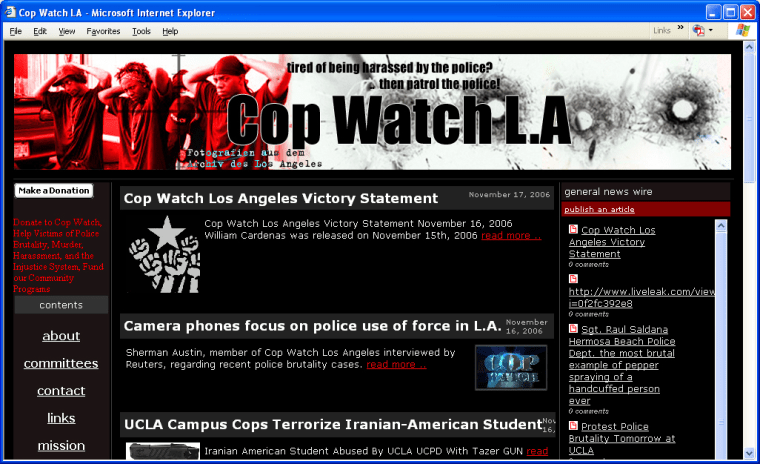Alleging racial profiling, a UCLA student intends to sue after a campus police officer shot him with a Taser stun gun. The incident was caught on a cell phone camera, the third time in a week that police behavior in the Los Angeles area was criticized after amateur video surfaced.
In the UCLA case, the student, who was stunned Tuesday night after he refused to show ID at a school library, thought he was being singled out because of his Middle Eastern appearance, his lawyer said.
Attorney Stephen Yagman said he plans to file a federal civil rights lawsuit on behalf of the U.S.-born student, Mostafa Tabatabainejad.
Yagman said Tabatabainejad, 23, declined to show his school ID because he thought he was being targeted for his appearance. His family is of Iranian descent.
Police said Tabatabainejad encouraged others at the library to join his resistance, and when a crowd gathered, the officer used the stun gun on him.
Yagman disputed that, saying Tabatabainejad started yelling to draw attention after the police officer pulled out the Taser.
Tabatabainejad was arrested for resisting and obstructing a police officer and later released on his own recognizance.
The incident, recorded on another student’s camera phone, showed Tabatabainejad screaming while on the floor of the computer lab.
UCLA’s interim chancellor, Norman Abrams, urged the public to withhold judgment while the campus police department investigates.
Several civil rights organizations, including Amnesty International and the Council on American-Islamic Relations, have called for an independent review.
Activists train others to use video
Amateur videos like the one that captured the UCLA incident are quickly becoming a powerful community tool in the debate about police conduct.
An earlier cell phone video shows Los Angeles police beating a man repeatedly in the face. Another shows a handcuffed, homeless man being blasted with pepper spray in the face.
Some Los Angeles grassroots groups are training citizens to use cameras, video cell phones and Internet sites like YouTube to get their voices, and pictures, heard.
“We urge everyone to have a camera on them at all times so if anything happens it can be documented. The concept of patrolling the police is something we are trying to push as a form of direct action,” said Sherman Austin, a founder of Cop Watch L.A., which launched its Web site three months ago.

The three videos that surfaced this month recall the 1991 beating of black motorist Rodney King by four police officers, which was caught on home video.
Fifteen years later, black and Latino activists in tough Los Angeles neighborhoods are leaving nothing to chance.
“We have tried civilian review boards, we have tried going to City Hall and going to the police and all we have seen is more brutality,” said Austin, 23.
“Technology makes it all the easier now. There are little digital cameras you can buy for 20 bucks in a drugstore that take good enough photos in daylight. And then there’s the Internet that gets it out there.”
Police chief's view
Los Angeles Police Chief William Bratton is investigating his officers’ conduct but cautioned against quick conclusions.
“I cannot make judgments based solely on videos or portions of videos,” Bratton said this week.
He contended there is no U.S. government agency that “has more policies, procedures, guidelines and independent oversight with respect to use of force than the LAPD.”
Ramona Ripston, executive director of the Southern California chapter of the ACLU, said the latest incidents underlined the case for more citizen oversight.
“This police department was a cowboy department, a department that was very quick on the trigger and it is hard to root out those practices from the past. That’s why the cameras are important,” Ripston said.
“If the police were not overreacting there would be no photographs to take.”
Austin, a dreadlocked African American with a police record, said he had been detained, followed and framed.
“I don’t remember how many times I have been pulled over by police or had the light shined in face because of the way I look. I am sick and tired of it. That’s why I thought it was necessary to start this organization because I can’t take it any more.”